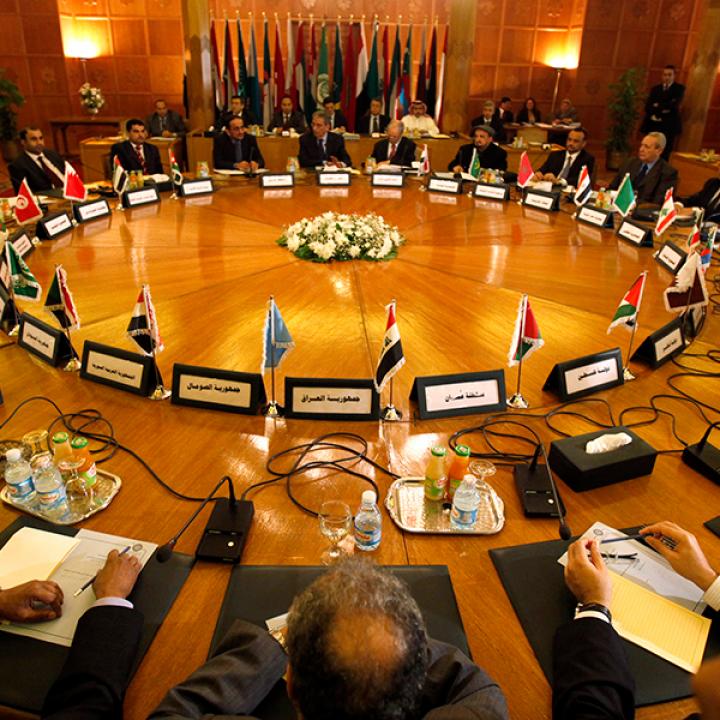

Experts debate whether and how such support has shifted amid growing Israeli-Arab cooperation and several years' worth of major regional crises.
While the continuing influence of the Palestinians on the Arab world should not be underestimated, the current landscape in the Middle East is bringing new policy priorities to the fore. As Israel’s ambassador to Washington, Ron Dermer, recently observed, “The Arab states are no longer dancing to the Palestinians’ tune.” BESA joins the debate by posing the question: What has happened to Arab support for the Palestinians? The following answers were submitted by Washington Institute senior fellow Sarah Feuer and adjunct fellow Neri Zilber. The full debate is available on the BESA Center website.
SARAH FEUER
I would perhaps reframe the question. It’s not that Arab countries have decided to withdraw their support for the Palestinians, but rather the nature of that support has become fragmented. This shift reflects the more general fragmentation afflicting the Arab world since the uprisings of 2011. With some states still reeling from the aftershocks of the “Arab Spring,” a resultant prioritization of domestic security and economic concerns on the part of key countries such as Egypt, as well as intra-Arab disputes that continue to simmer or intensify, the geopolitical bandwidth of many Arab countries has narrowed at the expense of the Palestinian cause. It has been downgraded from the top spot it traditionally enjoyed in these states’ foreign policy priorities (in rhetoric, if not always in action). The ongoing schism within the Palestinian national movement has likewise undermined Palestinian efforts to solicit and receive assistance.
Still, we should be careful about interpreting the fragmented nature of Arab support for the Palestinians as a decline in that support. For one thing, countries such as Qatar have continued to openly and generously support (certain) Palestinians, financially and politically. For another, even in states lacking the largesse of their Gulf peers, support flows in symbolically powerful ways. Consider Tunisia, where the 2014 constitution enshrined the population’s dedication to the Palestinian cause, and where the legislature will soon take up a bill criminalizing ties with the Jewish state. Even in Saudi Arabia, where Crown Prince Muhammad Bin Salman made headlines for tacitly acknowledging the Jewish people’s right to their own homeland, King Salman thereafter issued a strong rebuke of the Trump administration’s decision to recognize Jerusalem as Israel’s capital, as did the imam of the Grand Mosque in Mecca. Arab support for the Palestinians may no longer be coming from traditional forums like the Arab League, but support remains if one knows where to look for it.
NERI ZILBER
The Israeli government has, for a few years now, been marketing the notion that the Palestinian question no longer troubles the rest of the Arab world; that with the rise of Iran, shared security threats, and untold economic and technological opportunities, the Jewish state and the moderate Arab states are on a path to normalization irrespective of the Israeli-Palestinian conflict. Some have even referred to it as the “outside-in” paradigm, whereby progress regionally would dictate the future course of events in the Palestinian Territories (as opposed to vice versa). This notion is appealing as it absolves Israel of any responsibility for forward movement on the peace process. It also happens to be mistaken.
While not as central as it perhaps once was in Arab capitals—and even this centrality is debatable given the checkered history of Palestinian-Arab relations—the Palestinian question still resonates widely. Arab leaders—from Egypt’s Sisi to Jordan’s Abdullah to Saudi’s Salman—consistently emphasize the need for a two-state solution based on the 2002 Arab Peace Initiative, including East Jerusalem as the Palestinian capital.
More to the point, in their actions, too, Arab leaders are still heavily engaged with the Palestinian file, precisely because they view it as important in their own politics and societies. Egypt has attempted to facilitate the resumption of peace talks between Israel and the Palestinian Authority; it is now mediating both a Gaza ceasefire deal and a Fatah-Hamas reconciliation. Qatar is the largest donor state to the Gaza Strip (with Israeli encouragement). Jordan is, arguably, the strongest advocate for the Palestinians in Washington and is heavily invested in Jerusalem affairs, especially Al-Aqsa Mosque. Saudi Arabia, despite generational differences within its leadership, reemphasized the importance of Israeli-Palestinian peace and Jerusalem at a recent Arab League summit; it continues to provide financial aid to the PA.
None other than President Donald Trump undermined the “outside-in” paradigm when he relayed that 12 Arab leaders had approached him at a summit in Riyadh, all saying the same thing: “You can’t have peace in the Middle East without peace between the Israelis and the Palestinians.” Despite the real warming of relations between Israel and certain Gulf kingdoms, this is still largely the case, even if Israel wishes it weren’t.
BESA Center




